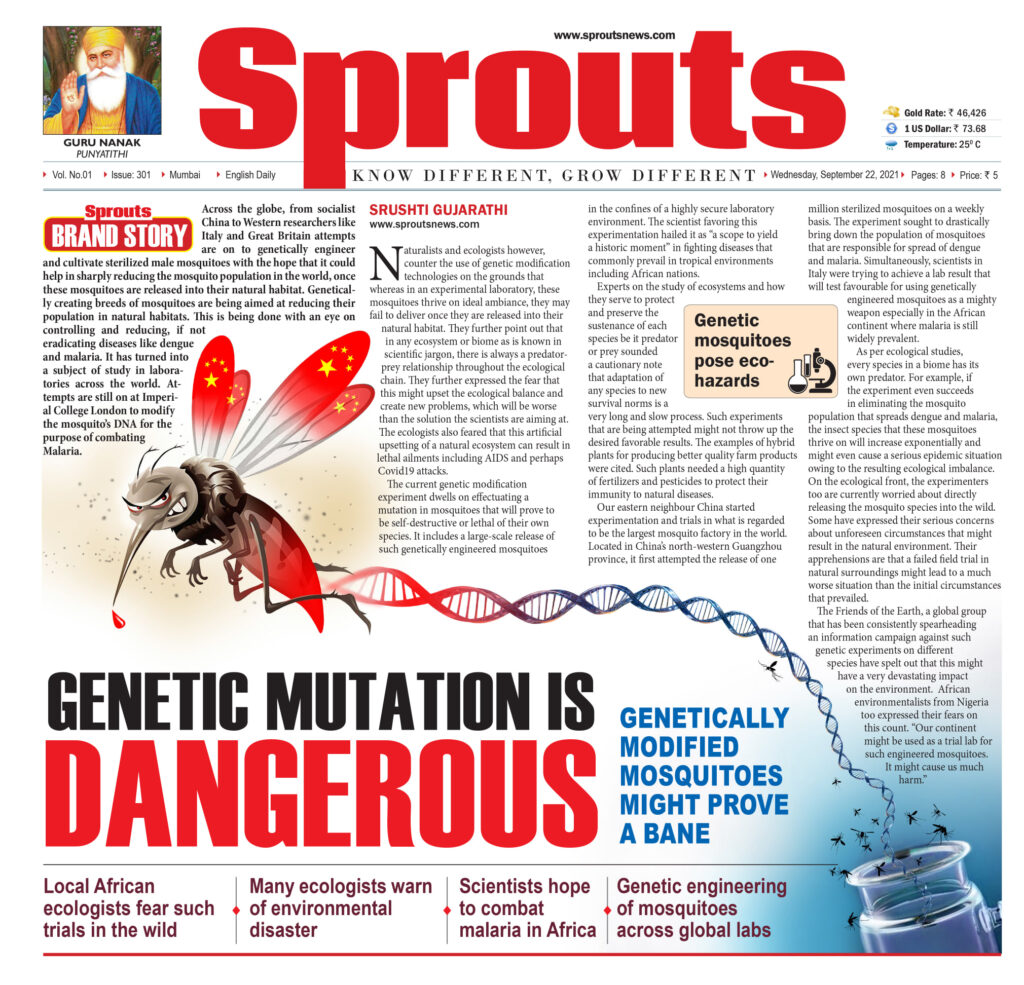
Across the globe, from socialist China to Western researchers like Italy and Great Britain attempts are on to genetically engineer and cultivate sterilized male mosquitoes with the hope that it could help in sharply reducing the mosquito population in the world, once these mosquitoes are released into their natural habitat. Genetically creating breeds of mosquitoes are being aimed at reducing their population in natural habitats. This is being done with an eye on controlling and reducing, if not eradicating diseases like dengue and malaria. It has turned into a subject of study in laboratories across the world. Attempts are still on at Imperial College London to modify the mosquito’s DNA for the purpose of combating Malaria.
Naturalists and ecologists however, counter the use of genetic modification technologies on the grounds that whereas in an experimental laboratory, these mosquitoes thrive on ideal ambiance, they may fail to deliver once they are released into their natural habitat. They further point out that in any ecosystem or biome as is known in scientific jargon, there is always a predator-prey relationship throughout the ecological chain. They further expressed the fear that this might upset the ecological balance and create new problems, which will be worse than the solution the scientists are aiming at. The ecologists also feared that this artificial upsetting of a natural ecosystem can result in lethal ailments including AIDS and perhaps Covid19 attacks.
The current genetic modification experiment dwells on effectuating a mutation in mosquitoes that will prove to be self-destructive or lethal of their own species. It includes a large-scale release of such genetically engineered mosquitoes in the confines of a highly secure laboratory environment. The scientist favoring this experimentation hailed it as “a scope to yield a historic moment” in fighting diseases that commonly prevail in tropical environments including African nations.
Experts on the study of ecosystems and how they serve to protect and preserve the sustenance of each species be it predator or prey sounded a cautionary note that adaptation of any species to new survival norms is a very long and slow process. Such experiments that are being attempted might not throw up the desired favorable results. The examples of hybrid plants for producing better quality farm products were cited. Such plants needed a high quantity of fertilizers and pesticides to protect their immunity to natural diseases.
Our eastern neighbour China started experimentation and trials in what is regarded to be the largest mosquito factory in the world. Located in China’s north-western Guangzhou province, it first attempted the release of one million sterilized mosquitoes on a weekly basis. The experiment sought to drastically bring down the population of mosquitoes that are responsible for spread of dengue and malaria. Simultaneously, scientists in Italy were trying to achieve a lab result that will test favourable for using genetically engineered mosquitoes as a mighty weapon especially in the African continent where malaria is still widely prevalent.
As per ecological studies, every species in a biome has its own predator. For example, if the experiment even succeeds in eliminating the mosquito population that spreads dengue and malaria, the insect species that these mosquitoes thrive on will increase exponentially and might even cause a serious epidemic situation owing to the resulting ecological imbalance. On the ecological front, the experimenters too are currently worried about directly releasing the mosquito species into the wild. Some have expressed their serious concerns about unforeseen circumstances that might result in the natural environment. Their apprehensions are that a failed field trial in natural surroundings might lead to a much worse situation than the initial circumstances that prevailed.
The Friends of the Earth, a global group that has been consistently spearheading an information campaign against such genetic experiments on different species have spelt out that this might have a very devastating impact on the environment. African environmentalists from Nigeria too expressed their fears on this count. “Our continent might be used as a trial lab for such engineered mosquitoes. It might cause us much harm.”

